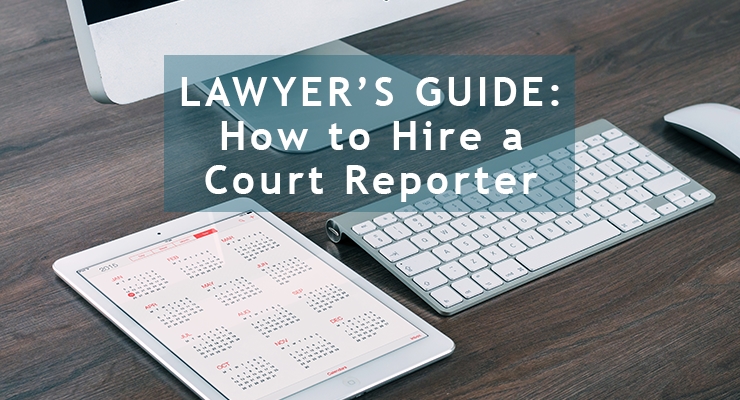
Here’s a hypothetical for you: Would you advise someone shopping for legal counsel to make their decision based strictly on price?
The answer is an obvious, “No.” Yet, there are many times when lawyers, paralegals or legal secretaries choose their court reporting service based solely on price. After all, the thinking goes, a court reporter is a court reporter, so you might as well choose the cheapest option and save your client some money.
The reality is far different. As experienced attorneys and litigators know, choosing a highly qualified and experienced court reporting company can make a world of difference in the construction and presentation of a case.
So, how should you hire a court reporter? Start with these eight questions:
1. Are your court reporters trained and certified?
Many states have either their own standards or conform to those put in place by the National Court Reporters Association. At a minimum, your court reporter should hold either state or national certification. However, you should also ask what additional certifications a company’s reporters hold, such as:
- Registered Professional Reporter (RPR)
- Registered Merit Reporter (RMR)
- Registered Diplomate Reporter (RDR)
- Certified CART Provider (CCP)
- Certified Legal Video Specialist (CLVS)
- Certified Manager of Reporting Services (CMRS)
2. How do you ensure accuracy and confidentiality?
Accuracy and confidentiality are the cornerstones of a court reporting company’s offerings. The company you choose should be able to provide an in-depth explanation of how accuracy and confidentiality are ensured, from the methods used to save and deliver transcripts, to reporters who are experienced and trustworthy.
3. Do your court reporters have experience covering highly technical cases, such as medical malpractice, patent or intellectual property?
If you’re working on complex litigation, a knowledgeable, experienced court reporter is invaluable. Court reporters with experience handling medical, engineering or technical terminology will ensure that you have an accurate record with a minimum of interruption or distraction during depositions. Choosing a company that offers reporters with a subject-matter background will also ensure that, should you find yourself filing an appeal, you will have an accurate, complete record upon which to build your case.
4. How much will it cost? Does this include transcripts? Are there any other fees or charges? What else is included?
Of course you should be asking about price. But you should also be asking what is included. The court reporting service you choose should be able to quickly provide you rates for appearance fees, transcript page rates and other fees.
5. How do you send out transcripts? What formats do you provide? Do you offer expedited transcripts?
Your court reporting company should be able to offer you a variety of options for your transcripts, from physical copies to searchable, indexed e-transcripts. Be sure to ask about archival services and real-time streaming transcripts as well. Make sure they will be able to get you what you need, when you need it.
6. How convenient is it to schedule a court reporter?
Sometimes you need to schedule a deposition on short notice. In the cases where you have only two or three days to schedule, you’ll want to work with a service that can accommodate your needs. Find out how much time the court reporting company needs before your deposition to be able to provide a reporter. And, find out if scheduling can be done on the company’s website and/or via email so you can schedule any time of the day.
7. What is your court reporters’ service area? Do they provide nationwide scheduling?
Depositions don’t always take place in your home city. Working with a court reporting firm that offers regional and statewide service is a benefit not to be overlooked. If you need to schedule court reporters out of state, can the company you use accommodate?
Here are some reasons to use your local court reporter to schedule out-of-state depositions:
- Quality Court Reporters – You get a quality court reporter no matter where you are going in the country.
- Convenience – You always know where to find your transcripts. Have you ever lost a transcript and not known who to call? If your court reporter sets up out-of-state court reporters you will always know where to find your transcript or exhibits.
- Time Savings – If your court reporter regularly sets up out-of-state depositions, they will know who to call and have a database of court reporters, videographers and process servers they know and trust.
- Confirmation – You will always get a confirmation of your request via email or phone call so you know you have a court reporter the next day for any out-of-town deposition.
- Standardized Orders and Billing – If your court reporter schedules your out-of-town deposition, you will always get your standard order in a format that you are used to. You will also only get billed for your standard orders.
8. Does your court reporter offer HD videoconferencing and real-time transcription? Does your court reporter have in-house videographers? Is technical support available?
Not every deposition needs to be held face-to-face. Many times, the expense, wasted time and frustration of travel can be avoided by scheduling depositions via HD videoconferencing. Meanwhile, your depositions can be even more impactful when you and your team have access to a live, streaming transcript. The court reporting company you choose should be able to provide you with both, while ensuring that the offerings are plug-and-play so that you can spend time preparing for your deposition or meeting, instead of worrying about hardware compatibility.
In another related article, HD Videoconferencing Deposition Tips and Technology for Attorneys, we discuss how to cut down on travel expenses and have great depositions with newer HD videoconferencing technology.
For more information, learn more about our court reporters and court reporting services or give us a call at 1-800-894-4327.